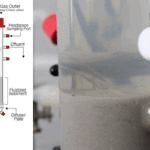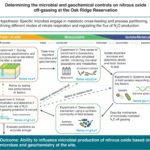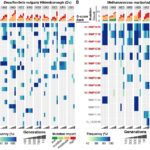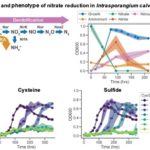
Institute for Systems Biology
Environmental Simulations Science Lead
nbaliga@systemsbiology.org
(206) 732-12661
Nitin Baliga, as the Environmental Simulations (EnvSim) Science Lead, develops technologies (e.g., Fluidized Bed Reactors) and computational methods (e.g., EGRIN and PRIME) to develop a predictive and mechanistic understanding of complex ecological phenomena at a systems level. He works closely across all aims to formulate hypotheses based on field-observed ecological phenomena, and coordinate activities across labs to dissect the hypotheses using synthetic microbial communities (SynComs) that are assembled from field isolates.
The main goal of activities overseen by Dr. Baliga is to elucidate the environmental context and associated regulatory and metabolic processes underlying process partitioning and physiological state shifts in the nitrate respiration pathways of selected field isolates (e.g., Rhodanobacter sp R12. and Acidovorax sp. 3H11) and SynComs. Using laboratory reactors systems such as Fluidized Bed Reactors (FBRs), the EnvSim team will simulate dynamic ecologically relevant environmental changes (such as those induced by rainfall) to uncover mechanisms by which microbial communities shift towards incomplete denitrification leading to N2O off-gassing at the ORR. Further, the EnvSim team will develop methodology and metrics to quantify the resistance, robustness, and resilience of microbial communities to complex environmental fluctuations. They will investigate multiomic (transcriptomic, proteomic, metabolomic, etc.) changes associated with adaptation of planktonic and attached SynComs to diverse abiotic changes (i.e., metals, pH, O2, and C/N ratios) to develop Environment and Gene Regulatory Influence Network model (EGRIN 3.0); and construct a PRIME model (Phenotype of Regulatory Influences integrated with Metabolism and Environment). The EGRIN and PRIME models will give unprecedented insight into the causal and mechanistic drivers of regulatory and metabolic changes across a microbial community in the context of ecologically relevant phenomena observed at the ORR.|
The EnvSim team will also perform adaptive laboratory evolution in variable pH and nitrate conditions to uncover mechanisms that drive emergence or disruption of cooperativity and process partitioning across members of nitrate-reducing SynCom. Ultimately, Dr. Baliga will work closely with other Science Leads to coordinate activities across campaigns to enable iterative characterization of ecological hypotheses through field-to-lab-to-field investigation cycles.
Relevant Publications
 From Field-to-Lab and Lab-to-Field: How Microbes Evolve, Form Partnerships and Work Together - Researchers in the Institute for Systems Biology’s Baliga Lab examined model organisms from two classes of microbes whose interaction converts over a gigaton of carbon to methane each year and found that gene mutations selected for over a relatively short timeframe in the two microbes –Desulfovibrio vulgaris (Dv) and Methanococcus maripaludis (Mm)– led to distinct functions, specifically ecotypes, or sub-populations,… More →
From Field-to-Lab and Lab-to-Field: How Microbes Evolve, Form Partnerships and Work Together - Researchers in the Institute for Systems Biology’s Baliga Lab examined model organisms from two classes of microbes whose interaction converts over a gigaton of carbon to methane each year and found that gene mutations selected for over a relatively short timeframe in the two microbes –Desulfovibrio vulgaris (Dv) and Methanococcus maripaludis (Mm)– led to distinct functions, specifically ecotypes, or sub-populations,… More → An Integrated Conceptual Microbial Ecology Framework - March 24, 2021-AHolistic Modeling Framework Integrating Laboratory and Field Studies for Microbial Ecology. The Science Microbial communities serve critical roles in all ecosystems and have a profound impact on human health, environmental health, and industrial capabilities. As such, it is desirable to have robust, actionable directions for the intervention of microbial community function. However, the multiscale, stochastic, Spatio-temporal and diverse nature… More →
An Integrated Conceptual Microbial Ecology Framework - March 24, 2021-AHolistic Modeling Framework Integrating Laboratory and Field Studies for Microbial Ecology. The Science Microbial communities serve critical roles in all ecosystems and have a profound impact on human health, environmental health, and industrial capabilities. As such, it is desirable to have robust, actionable directions for the intervention of microbial community function. However, the multiscale, stochastic, Spatio-temporal and diverse nature… More → Scientists Uncover Mechanistic Evidence on How Cooperation Evolves in Mutualistic Microbial Communities - February 21, 2021-Researchers map early adaptive events in evolution of mutualistic interactions with a broad range of applications for biotechnology, medicine and environment. Turkarslan, Serdar; N. Stopnisek, A.W Thompson, C.E Arens, J.J Valenzuela, J. Wilson, K.A Hunt, J. Hardwicke, S. Lim, Y.M Seah, Y. Fu, L. Wu, J-Z Zhou, K.L Hillesland, D.A Stahl, N.S Baliga (2021) Synergistic epistasis enhances cooperativity… More →
Scientists Uncover Mechanistic Evidence on How Cooperation Evolves in Mutualistic Microbial Communities - February 21, 2021-Researchers map early adaptive events in evolution of mutualistic interactions with a broad range of applications for biotechnology, medicine and environment. Turkarslan, Serdar; N. Stopnisek, A.W Thompson, C.E Arens, J.J Valenzuela, J. Wilson, K.A Hunt, J. Hardwicke, S. Lim, Y.M Seah, Y. Fu, L. Wu, J-Z Zhou, K.L Hillesland, D.A Stahl, N.S Baliga (2021) Synergistic epistasis enhances cooperativity… More → Sulfur Metabolites Play Key System-Level Roles in Modulating Denitrification - JANUARY 2021 Using systems analysis to elucidate the roles that hydrogen sulfide and cysteine play in inhibiting the growth of a nitrate-reducing Otwell AE, Carr AV, Majumder ELW, Ruiz MK, Wilpiszeski RL, Hoang LT, Webb B, Turkarslan S, Gibbons SM, Elias DA, Stahl DA, Siuzdak G, Baliga NS. 2021. Sulfur metabolites play key system-level roles in modulating denitrification. mSystems 6:e01025-20.… More →
Sulfur Metabolites Play Key System-Level Roles in Modulating Denitrification - JANUARY 2021 Using systems analysis to elucidate the roles that hydrogen sulfide and cysteine play in inhibiting the growth of a nitrate-reducing Otwell AE, Carr AV, Majumder ELW, Ruiz MK, Wilpiszeski RL, Hoang LT, Webb B, Turkarslan S, Gibbons SM, Elias DA, Stahl DA, Siuzdak G, Baliga NS. 2021. Sulfur metabolites play key system-level roles in modulating denitrification. mSystems 6:e01025-20.… More →